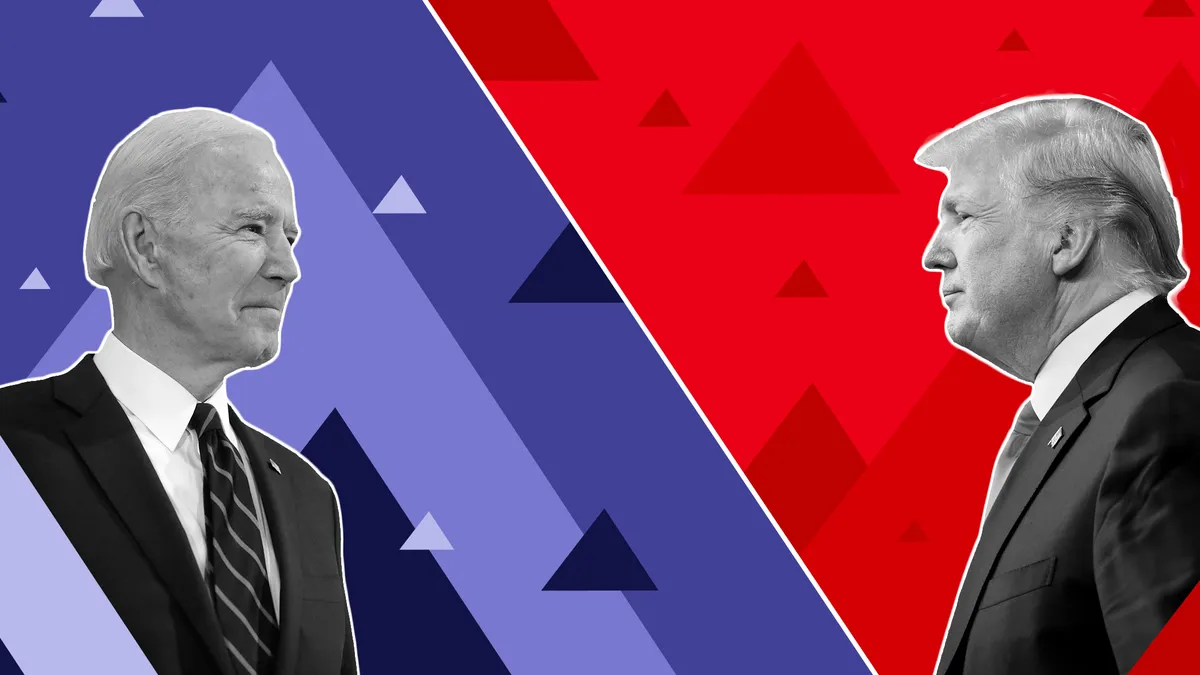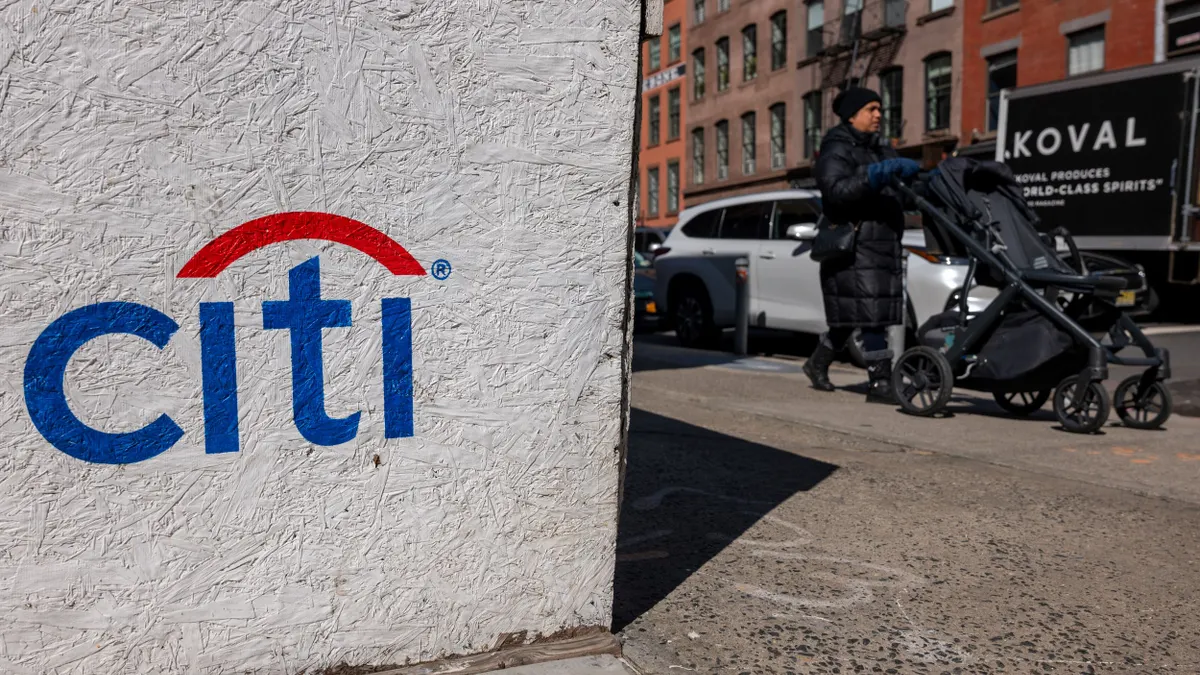With one more debate ahead of the presidential election, it's not likely financial policy or bank regulation will come up before Nov. 3.
The rhetoric from former Vice President Joe Biden and President Donald Trump during the first debate, as well as during last week's separate town halls, has largely focused on the ongoing coronavirus pandemic, the economy, the Supreme Court and police reform.
While financial policy may be missing, a look at Biden's platform and the actions taken during the Trump administration's four years can provide some insight as to what bankers can expect to see under either outcome.
Banking Dive spoke to several academics, consultants and legal experts about what may change or stay the same in the banking sector under a new Biden administration or a second Trump term.
Tax policy
While neither candidate has addressed financial policy directly, their divergent stances on tax policy will have strong implications on the banking industry over the next four years.
"Tax policy is going to impact the financial services sector in a big way," said Aaron Cutler, partner in the government affairs unit at law firm Hogan Lovells. "Vice President Biden's already come out with this plan talking about increasing the corporate tax rate, and that will hit the banking sector."
Banks were among the biggest beneficiaries of the Trump administration's 2017 tax overhaul, which slashed the corporate tax rate from 35% to 21%.
That overhaul saved the nation's top six banks a combined $32 billion since the law was enacted, according to a Bloomberg analysis.
Biden's tax plan includes a partial rollback of the Tax Cuts and Jobs Act by raising the corporate tax rate to 28%, a change that would cost the country's 10 largest banks a combined $7 billion per year in additional taxes, according to a report by S&P Global Market Intelligence.
Will postal banking return?
In recent months, Democrats have renewed calls to reestablish postal banking, a system available in the U.S. from 1911 to 1967.
Democrats have managed to include an amendment that allocates $2 million for a postal banking trial program in an appropriations bill passed by the House of Representatives in July.
Advocates for postal banking say the U.S. Postal Service is capable of offering financial services to poor and rural communities that lack bank branches, reducing the number of unbanked households in the U.S.
A recent report by the Federal Deposit Insurance Corp. (FDIC) could lead to wider efforts to increase the number of banking options made available to Americans amid the pandemic.
Although the number of American households with bank accounts grew in 2019, the economic disruption caused by the pandemic could lead to an increase in unbanked people, the FDIC said in its recent biennial report.
"It's less likely under Trump, and I think more likely under a Biden administration," David Schultz, a professor of political science at Hamline University, said of whether the service is likely to return to the nation's post offices.
The U.S. Postal Service's funding, as well as its ability to handle an influx of mail-in ballots amid the coronavirus pandemic, has come under increased scrutiny ahead of the election. Sens. Bernie Sanders, I-VT, and Kirsten Gillibrand, D-NY, who reintroduced a version of the Postal Banking Act last month, claim the system would create around $9 billion in annual revenue for the agency.
Schultz said a Biden administration might pursue postal banking as a way to reinvigorate the financial solvency of the agency.
"At the same time ... I don't see the U.S. postal system, in general, as a high priority for the Trump administration," he added.
Cutler said he thinks postal banking may be on the Biden administration's agenda, but would most likely be rolled into a comprehensive postal reform bill.
"I can't imagine that that would be a first-six-month priority for Democrats taking the majority and the White House," he added.
The future of the CFPB
Democrats have long argued the Consumer Financial Protection Bureau (CFPB) has abandoned its mission to protect consumers under the Trump administration.
The agency, which was born out of the 2008 financial crisis, would likely be "rejuvenated" under Biden, Schultz said.
"It's going to get more prestige in [a Biden] administration and so forth. There'll be pressure to crack down on credit fraud and credit problems and illegitimate institutions that want to do banking," he said.
The CFPB found itself at the center of a Supreme Court case that called into question the very constitutionality of the agency's existence. The case, Seila Law v. CFPB, argued the regulator's setup is unconstitutional because it gives the president the power to fire the director only "for cause."
The court ruled 5-4 in June that the president can fire the director of the CFPB "at will," in favor of the California debt collection law firm that argued it should not have to comply with a CFPB civil investigative demand because the bureau's leadership violated the Constitution's separation-of-powers rule.
"The Consumer Financial Protection Bureau has really been gutted [under the Trump administration]," said Mayra Rodriguez Valladares, a capital market consultant and trainer who works with banks on risk and management issues. "The CFPB was never anything that the Republicans wanted. They fought it hard when it was going to be part of Dodd-Frank, and then when the law passed, they have fought its design, mission, its objectives every step of the way."
The agency has eased up on the industry under Trump, bringing an average of 20 enforcement actions annually, compared with 31 under the Obama administration, according to an analysis by Reuters.
That would likely change under Biden, said Cutler, who added bankers should expect to see a "very aggressive" CFPB, should the former vice president win.
More robust enforcement actions from the agency will force the industry to spend more on compliance, he added.
"It will have them refocus their budgets on more aggressive compliance programs with their banks and having to spend more time dealing with regulators and agencies instead of other profit-making business activities," he said. "We'll definitely see more from the CFPB and a focus on consumer financial services regulation."
In light of the Supreme Court's recent ruling regarding the CFPB, the agency could also see a new director under a Biden presidency. CFPB Director Kathy Kraninger's term ends in 2023.
"[I]f Biden wins the White House, and the Senate flips, too, I think there's a very high likelihood that Kraninger will be quickly replaced," Christopher Willis, a partner at law firm Ballard Spahr, told Reuters.
The agency's director, however, is not typically a Day One appointment, said Kara Ward, a Holland & Knight partner.
"We wouldn't see the change in guard over there probably until summer, maybe even moving into the fall," she said during a webinar this month. "So it'd be status quo for about a year."
Cannabis banking legislation
The Secure and Fair Enforcement (SAFE) Banking Act, legislation aimed to protect banks that service legal cannabis businesses, could gain ground under a Biden presidency, some legal experts said.
"I think something happens [with cannabis banking] in the next four years, but I would bet that it happens in the latter part of the four years," should Biden win the White House, Ward said. "I don't know if the country's quite ready this year or next year to make it easier, but the first shoe to drop, in my opinion, is cannabis banking becoming more easy to do."
Ron Klein, a fellow partner at Holland & Knight, said he's "a little more bullish" on the issue.
"First of all, it definitely doesn't happen in an election year, for sure," he said during the webinar. "But if it were to happen, it would happen sometime maybe later this first year or later in the third year. ... I think there's a lot of pressure from underneath to get it done and there are a lot of businesses that are interested in doing it. And clearly, there are still a lot of political views that it's not the right thing to do. But I think the cow's out of the barn — it's already operating in many states."
The legislation, however, isn't expected to gain much traction under a second Trump term, Cutler said.
"Under Trump, I don't see it," he said. "Under Biden, I can see them making progress on that issue. It might be tougher for Democrats to go whole hog on cannabis and just make it legal, but actually doing the banking piece of it, that might be something achievable baby steps toward making it legal."
The future of the SAFE Banking Act looked promising last year when the Democrat-controlled House passed the landmark bill in September by a 321-103 vote.
By December, however, the bill hit a roadblock in the Republican-controlled Senate after Banking Committee Chairman Mike Crapo, R-ID, said he couldn't support the legislation in its current form, calling for its language to address a series of broader issues, including lack of research and safety issues regarding cannabis.
There is a slight chance the measure could become law before the election is decided if lawmakers manage to pass a fresh coronavirus relief bill in the coming weeks.
While lawmakers in both major parties work to come to an agreement on another aid package, House Democrats have managed to twice fold the SAFE Banking Act into previous coronavirus proposals the chamber has passed.
As recently as Monday, Senate Minority Leader Chuck Schumer, D-NY, introduced a coronavirus relief bill that includes language protecting banks that service cannabis-related businesses, Marijuana Moment reported.
It remains to be seen whether Senate Republicans would approve a coronavirus aid bill that includes cannabis provisions.
Cabinet appointments: Who stays and who goes?
In March, Axios reported it had been given a list of names the Biden campaign was weighing as potential Cabinet appointees.
JPMorgan Chase CEO Jamie Dimon, Bank of America Vice Chairman Anne Finucane and Sen. Elizabeth Warren, D-MA, were on the list, the news site reported.
Warren, a former presidential contender and the architect of the CFPB, is reportedly on Biden's shortlist for Treasury secretary, while Dimon and Finucane are being floated as possibilities for additional roles at the Treasury Department.
If Biden wins, Cutler said he expects Warren to be given a key role in financial services, policy and regulation.
Ward, however, expressed doubt that Warren would be willing to give up her Senate seat for a role in the Biden administration, citing a Massachusetts law that allows the state's governor to fill an empty Senate seat.
The state's Republican governor, Charlie Baker, would likely select a conservative lawmaker to fill Warren's seat.
"That could change the balance of power in the party," Ward said.
Valladares said she expects Biden, not wanting to shake up the Federal Reserve amid the current economic environment, would likely keep Chairman Jerome Powell at the helm.
"Powell has had to navigate tremendous uncharted territory here in several ways, not only COVID, but dealing with such an interventionist president," she said. "I think that if Trump was to win again, he certainly could try to replace Powell. Frankly, I'm not sure that Powell would want to stay there another four years. This was just a brutal couple of years for him."
Brian Brooks, acting comptroller of the Office of the Comptroller of the Currency (OCC), may be out if Biden takes office, Valladares said.
"The OCC has been a bit of a troubled regulator with a reputation of being too cozy with the banks, so it is possible that he would want to replace the head of the OCC," she added.
FDIC Chairman Jelena McWilliams' job could be secure under Biden, Valladares said.
"I don't see him replacing the head of the FDIC. The agency has not been in the crosshairs of anybody," she said.






















